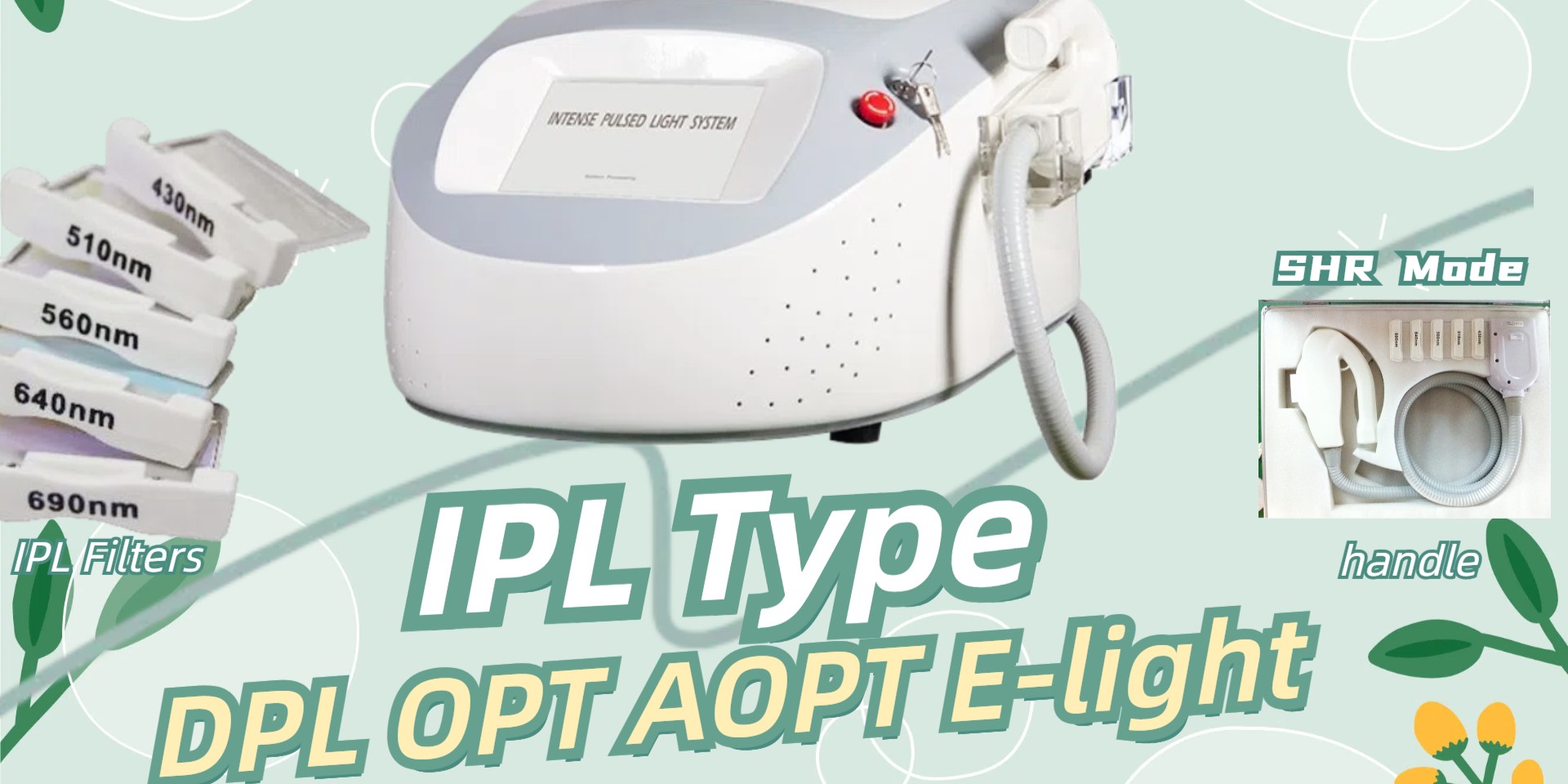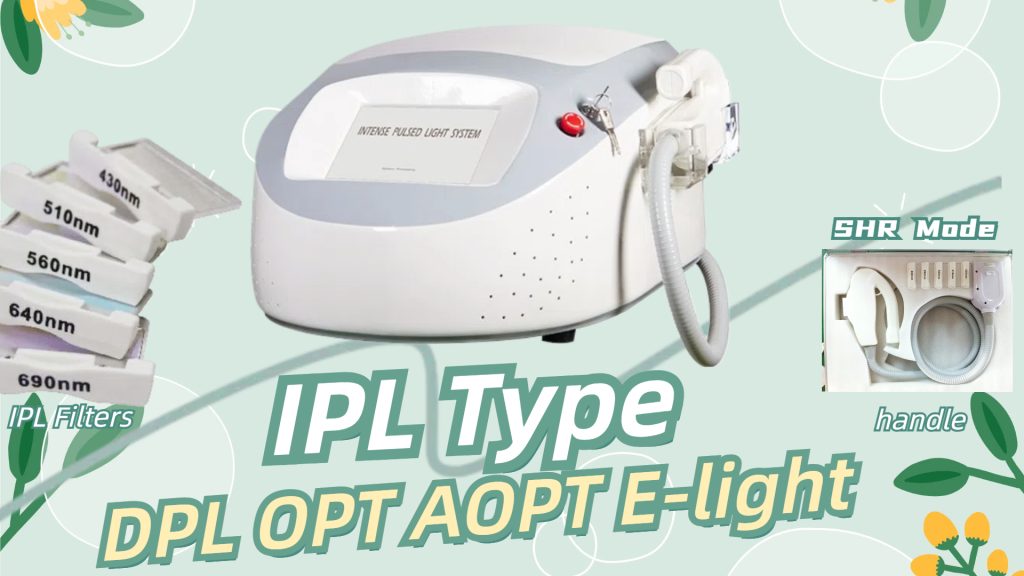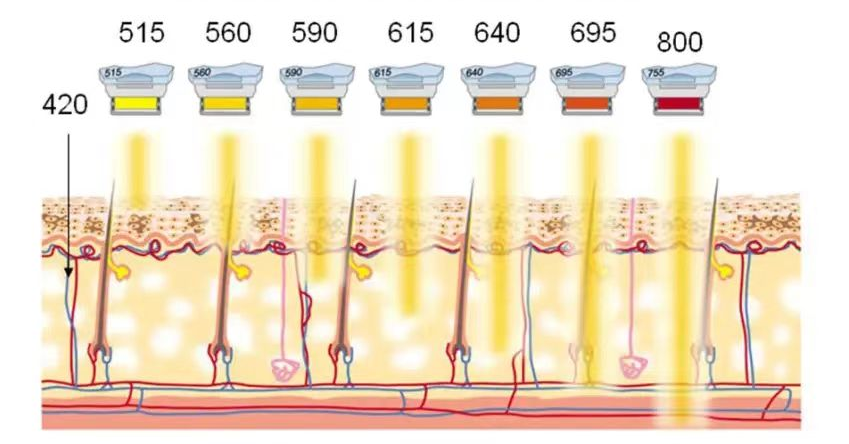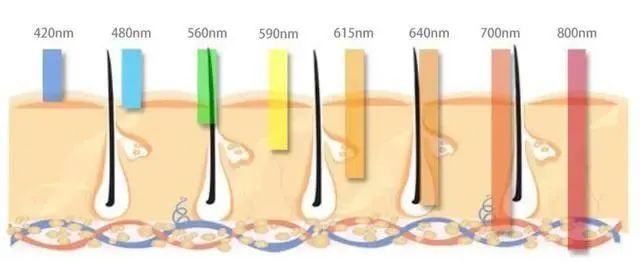
Article source: https://www.litonlaser.com/what-are-ipl-dpl-opt-aopt-and-e-light/
Photorejuvenation is an advanced high-tech beauty project that uses a specific wide-spectrum color light (removing ultraviolet rays, purple, and blue optical fibers that damage the skin). It is a strong light similar to laser but not laser. It directly irradiates the skin surface, penetrates deep into the skin, and selectively acts on subcutaneous pigments or capillaries. At the same time, it can stimulate the regeneration of subcutaneous collagen to a certain extent.
But it is different from laser. Laser has only one wavelength. Intense pulsed light is a continuous multi-wavelength incoherent light with a wavelength range of 500 to 1200nm. Because it can emit multiple wavelengths of light at the same time, it can cover multiple absorption peaks of multiple target color bases such as melanin, oxidized hemoglobin, water, etc.
The completion of photorejuvenation beauty projects often requires high-quality IPL machines. How much do you know about IPL intense pulsed light technology?

1. What is IPL (intense pulsed light) beauty technology?
IPL is the abbreviation of intense pulsed light, also known as Photorejuvenation, with a wavelength range of generally 500 to 1200nm. Use light and heat to allow the skin to repair itself and promote the proliferation and arrangement of collagen and elastic fibers. Its functions are comprehensive and extensive, including removing spots and whitening, removing red blood streaks, shrinking pores, fading acne scars, and fading fine lines.
To understand what intense pulsed light is, we need to introduce the concept of electromagnetic radiation.
Electromagnetic radiation is the energy transmitted in the form of waves by electric fields and magnetic fields in space. The interaction between electric fields and magnetic fields produces electromagnetic waves, which are emitted or propagated into the air to form electromagnetic radiation. Radio waves, microwaves, infrared rays, visible light, and ultraviolet rays are all electromagnetic radiation. Visible light is part of the electromagnetic spectrum. The colors of the rainbow we usually talk about, red, orange, yellow, green, blue, indigo, and purple, are visible light, but a large part of the light is invisible. The wavelength of intense pulsed light IPL is in the electromagnetic spectrum. It is a non-laser light source. The strong light emitted is concentrated and filtered to form a wide spectrum light, and the wavelength is mostly between 500-1200nm.
When IPL (wavelength 500-1200nm) acts on the skin, based on the principle of selective photothermal action, the spectrum of this band can be selectively absorbed by target color groups such as melanin, water and hemoglobin, which can improve skin epidermal spots, dull skin color, and vascular problems such as red blood streaks, inflammatory acne scars, and stimulate collagen regeneration, thereby improving the performance of skin photoaging and achieving the purpose of true skin rejuvenation. This is also the origin of “photon skin rejuvenation”.
2. What are the indications for photon skin rejuvenation?
- Fine lines and mild sagging on the face.
- Want to improve skin condition and enhance skin elasticity and smoothness.
- There are spots and freckles.
- The face is rough and dark, with acne scars, red blood streaks, and large pores.
The first three situations can generally have a more obvious improvement in the first time; the fourth situation requires 3-5 times to have a more obvious effect.
3. What is DPL (Delicate Pulse Light)?
The traditional IPL spectrum range is wide (400-1200nm). Even the usual coating filter only filters the energy of the short-wavelength part of the light. For example, the 560 treatment head only filters the light waves between 400-560nm, leaving the light wave range of 560-1200nm. Such treatment may not be accurate enough, the target tissues in the skin that can absorb light are complex, or it may cause unnecessary strong pain.
DPL is a method of using IPL to simulate the narrow spectrum of laser. It filters the wavelengths of the wide spectrum IPL at both ends, leaving a narrow spectrum energy in the middle, which can achieve the treatment effect and reduce the impact and pain of unnecessary light waves on the skin. For example, a certain DPL treatment head has a wavelength range of 550-650nm. It retains a high absorption spectrum range for pigments and hemoglobin, which has a good effect on the treatment of spots, red blood streaks, etc. DPL also has high requirements for hardware and IPL power supply. It must provide a very high total light output energy, otherwise the narrow wavelength light energy left after filtering is insufficient and cannot effectively destroy the target tissue to achieve the desired effect.
Therefore, DPL is a high-end upgraded version of IPL. The spectrum range is narrower, the accuracy is higher, and the targeting is stronger.The wavelength range is 550~650nm, and the excellent absorption rate of melanin, oxygen and hemoglobin are all within this range, which can improve vascular diseases and pigmentary diseases. DPL contains a sliding mode, which is more friendly to sensitive skin.
There are two different handpieces of 500-600nm and 550-650nm, which only intercept the middle 100nm band. Because the spectrum is narrower and the treatment is more precise, it is also called precision light.
3.1 DPL500 handle (500nm-600nm).
There are two hemoglobin absorption peaks at 542 and 577nm in the 500-600nm band, so it is very effective in treating superficial vascular problems such as facial capillary dilation and flushing. At the same time, it can promote the release of inflammatory factors after heating of vascular endothelial cells, which is beneficial to the proliferation of fibroblasts, thereby producing collagen and achieving the effect of skin rejuvenation.
The spectrum of intense pulsed light is compressed within 500 to 600nm, and contains two oxygenated hemoglobin absorption peaks. The spectrum is more targeted and is used for the treatment of vascular diseases such as capillary dilation, post-acne erythema, facial flushing, and port wine stains.
3.2 DPL500 handle (550nm-650nm).
The 550-650nm handpiece is in a special band where melanin absorption is high and hemoglobin absorption decreases rapidly, so this band is most advantageous for melanin problems. Therefore, it is more accurate and efficient to treat pigmented lesions.
The spectrum of intense pulsed light is compressed within 550 to 650nm, while ensuring the ratio of melanin absorption rate and penetration depth, and is used to treat pigmentary diseases such as freckles, sun spots, and age spots.

4. What is OPT (Optimal Pulse Technology)?
OPT: Optimal Pulse Technology, perfect pulse technology. The uneven peak wave of traditional photon pulse energy is optimized into a square wave with equal pulse energy. The photothermal effect can reach the deep layer of the skin, which is better than IPL.
Early IPL had some inherent shortcomings. Due to its power supply capacity and insufficient control circuit design, its sub-pulses could not achieve true balanced output, resulting in a situation of “one effort, then decline, and then exhaustion”. It is impossible to achieve the ideal therapeutic effect of balanced output of multiple sub-pulses. The emergence of OPT technology has basically solved the above problems. This type of equipment has good hardware configuration and is relatively expensive.
Effect: It has obvious effects in removing spots and whitening, stimulating collagen, and has strong comprehensive ability. It can play a certain role in skin rejuvenation, firming, shrinking pores, and fading fine lines. The operation is more stable than IPL and the effect is better.
5. What is AOPT (Advanced Optimal Pulse Technology)?
AOPT: Advanced Optimal Pulse Technology, an upgrade of OPT, a more advanced perfect pulse technology, adding filters specifically for acne and blood vessels on the basis of OPT. . This technology allows the energy density of a single sub-pulse to be adjusted. For high-level doctors, this iteration of technology can make subtle adjustments to the treatment details according to the skin condition of the beauty seeker. Doctors with high standards and high requirements for treatment will like to explore this AOPT.
6. Does E-light also belong to IPL?
E-light is a combination of light energy + radio frequency, which has stronger penetration and more targeted effects, reduces the energy of light energy, and can be used for sensitive skin.
Through some clinical tests, it is believed that under the synergistic effect of radio frequency (RF), the light emitted by IPL plus radio frequency can penetrate the target tissue in the dermis more effectively.
The basic meaning of “E light” is to add a set of radio frequency emission electrode plates on both sides of the light-guiding crystal of the IPL treatment head, and emit radio frequency energy before and after IPL light irradiation to heat the skin. The combination of light emission and radio frequency reduces the impedance of the target tissue, achieving more effective selective heating of the target tissue, thereby more effectively obtaining the treatment effect, such as hair removal.
7. Other types of IPL technology (NIP, BBL).
NIR (near infrared light): commonly known as milk light, the light energy wavelength is longer, the depth is deeper, and the skin rejuvenation effect is relatively more prominent. The selected spectrum is 900-1600nm, the peak is 1300nm. Because NIR penetrates deeper than visible pulse light (it is the deeper penetration among light and laser), it can penetrate the epidermis and directly heat the water molecules in the dermis, stimulate the increase of collagen, and make the skin tighter.
BBL (Broad Brand Light): In contrast to DPL, it has a wider spectrum range, more uniform light, and a wider range of applications. Direct translation is broad spectrum light, which is the same as IPL intense pulsed light. It has up to ten, uniform energy output, and mild effect. There are also literatures that support the gene sequence that can reverse photoaging of the skin and reduce the phenomenon of delayed skin photochemical reaction.

8. How to choose a suitable IPL beauty machine?
Photorejuvenation is still a hot beauty project today, and it is still the main service in Europe and America. Through the article, we also know that the machine that realizes photorejuvenation is IPL intense pulsed light beauty equipment, among which OPT, DPL, AOPT, E light, NIR, BBL, and even SHR mode and other technologies are all branches and upgrades of IPL technology. To some extent, they can all be called IPL!
So how should we judge and buy such a popular machine?
As a beauty machine manufacturer and optoelectronic training institution, Litonlaser can tell you that if you need to do a good job in the beauty project of photorejuvenation, you need to consider three factors.
8.1 IPL handles with different wavelength ranges can achieve different functions.
Although IPL is a technology that belongs to a range of light waves, the longer the wavelength, the deeper it reaches the skin, so different wavelengths can enter different skin layers, thereby achieving different skin functions.
8.2 The level of the operator also determines the effect of the beauty project.
We all know that the more skilled the operator is, the easier it is for him to achieve customer satisfaction. Each photoelectric treatment requires experience. We, Litonlaser, have conducted clinical treatments on a variety of beauty projects and a variety of skin groups, and obtained the treatment endpoint response of photoelectric beauty.
We need operators to master the endpoint response of each beauty treatment so that the final effect can be achieved.
8.3 A stable and reliable IPL beauty machine is a key step.
In addition to the above two, we also need to go back to the machine itself. A good machine can make us even stronger!
For IPL machines, it mainly operates through circuits and waterways, and dual channels, so we require stable and uniform light output, which requires safe and reliable machine manufacturing experience!
Litonlaser started producing the first IPL in 2005, and now has almost 20 years of experience in producing IPL machines. Our machines use stable and uniform laser bars, and there will be no problems in 5 years. For the water source, we require all customers to use distilled water! Only clean water can make the light output through the water flow complete and uniform. The spot size should be uniform and the output energy should be stable. These are the conditions required for excellent IPL equipment.
All of our Litonlaser IPL machines can meet these conditions, and according to the needs of different customers, there are different configurations, including portable IPL beauty machines, E-light IPL machines, OPT machines, DPL machines, and each machine can be equipped with radio frequency and SHR (fast hair removal mode).
If you need to order an IPL machine, or are interested in beauty machine training, please feel free to contact us: Beauty machine manufacturer LITONLASER.